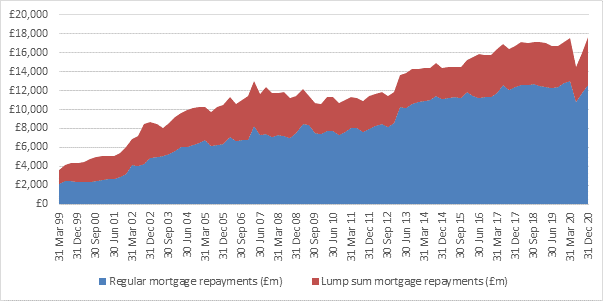Lockdown savings fuel record mortgage repayments as households polarised by the pandemic
UK households have repaid a record £17.6bn of mortgage debt in just three months – equivalent to £192m a day – as lockdown savings helped some existing borrowers to reduce their debt commitments.
Main points:
- £17.6bn of mortgage debt repayments in Q4 2020 – equivalent to £192m each day
- Lump sum repayments reach £5.1bn, surpassing the previous high from 2007
- However, regular mortgage repayments decrease year-on-year as households absorb the impact of the pandemic
- National mortgage debt continues to rise towards a record £1.5 trillion
Analysis of official data by the Equity Release Council, the representative trade body for the equity release sector, shows a surge in lump sum capital repayments between October and December 2020.
However, the findings from Bank of England figures show that, while over-payments have soared, regular loan repayments remained below pre-pandemic levels as some mortgage holders continued to defer payments in the face of financial pressures.
The nation’s total mortgage debt also rose to a new high of almost £1.5trn by the end of 2020. This figure has increased by £44bn in the last year alone and is three times higher than the £494bn of mortgage debt accrued in 2000.
Mortgage holders polarised by the pandemic
The Council’s findings show UK mortgage holders made an unprecedented £5.1bn of lump sum repayments in Q4 2020. This was an 18% annual rise from Q4 2019 and a 22% quarterly rise from Q3 2020 to surpass the previous high of £4.9bn (Q3 2007) by £133m.
Rising repayments are likely to have been helped by the extra savings accrued by households last year, when retail savings deposits increased by £127bn between March and December.
The savings spree came about as travel restrictions were imposed to contain Covid-19 and household spending was curtailed by the shut-down of retail, leisure, hospitality and tourism.
A separate Bank of England survey in November 2020 highlighted that 28% of households have accrued extra savings during the pandemic, while 20% have depleted their savings despite wide-reaching Government support such as the furlough scheme [1].
The final quarter of 2020 also saw mortgage holders make £12.6bn of regular repayments. This increased from £11.87bn in Q3 and £10.7bn in Q2, when over 1.6m mortgage payment holidays were granted to financially pressured households in the early stages of the pandemic [2].
However, regular mortgage repayments remain lower than before the pandemic first hit, with £12.8bn having been repaid in Q4 2019 and £13bn in Q1 2020. Mortgage holidays were due to end in October 2020 but were extended to July 2021 as many households continue to rely on special measures to manage their financial commitments.
Graph 1: Regular and lump sum mortgage repayments per quarter, 1999-2020
The Financial Conduct Authority’s recent Financial Lives survey showed that, across all households, 38% of adults have seen a negative financial impact from Covid-19 – more than twice as many as those who have experienced a positive impact (15%) [3].
Research by the Equity Release Council and Key also highlighted that more than one in three homeowners aged 55+ are worried about running out of money in retirement (34%), up from 27% before the pandemic [4].
Jim Boyd, CEO of the Equity Release Council, comments:
“These figures suggest mortgage holders across the nation have been polarised by the experience of the pandemic. The unexpected gift of extra savings has helped some households to pay down mortgage debt and, by doing so, increase the property wealth they can look to later in life to boost their retirement funds, either by downsizing or releasing equity.
“At the same time, Covid relief measures have been vital to help hard-hit families manage the immediate impact of income loss by pausing their repayment obligations. The Spring Budget has extended short-term support via the furlough scheme, and mortgage payment holidays are continuing until the end of July. The pandemic will clearly have a much longer-term impact, but the gradual rise in national mortgage debt means borrowing into later life has already become increasingly common.
“Access to flexible finance is just as important to manage the journey through retirement as working life. Growing demand and changing needs have brought about a revolution in later life lending which has transformed the options for older borrowers. It is crucial that consumers can rely on clear safeguards and expert advice that considers all implications and alternatives.”
References:
[1] Bank of England, Has Covid affected household savings? 25 November 2020
[2] UK Finance, Lenders grant 1.6 million payment holidays to mortgage holders, 28 April 2020
[3] FCA, Financial Lives 2020 survey: the impact of coronavirus, 11 February 2020
[4] Equity Release Council and Key, The Pension / Property Paradox: revisiting the retirement confidence gap, 25 November 2020
Kindly shared by Equity Release Council (ERC)
Main photo courtesy of Pixabay



















